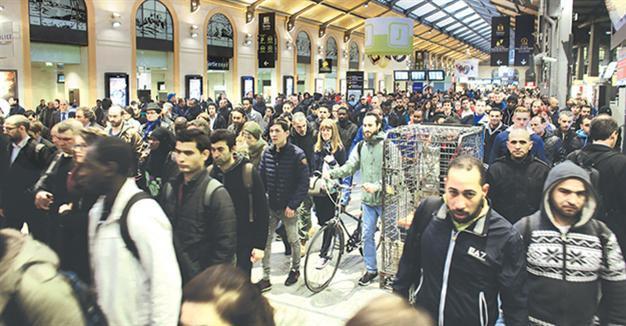Trains grind to a halt as strikes grip France
PARIS – Agence France-Presse

Transport chaos hit France again on June 1, just nine days ahead of Euro 2016, as railway workers went on strike in the latest salvo of a months-long battle between the government and unions.
Between a third and half of France’s trains were expected to grind to a halt, as workers from railway operator SNCF launched their eighth strike in three months, this time saying it will continue until demands for better pay and conditions are met.
The action has piled further pressure on the already deeply unpopular socialist government, which has been besieged by months of protests and work stoppages over a controversial labor reform bill.
Metro workers in the capital were planning to walk off the job from June 2 and Air France pilots have threatened a lengthy strike in the coming weeks, when the Euro 2016 football tournament is in full swing.
“This week will see the strongest mobilization in three months” of strikes, the head of the powerful CGT union Philippe Martinez said on May 31.
Since March, hundreds of thousands of people have taken to the streets in demonstrations that have frequently turned violent, while petrol pumps ran dry last week due to blockades of refineries and depots by CGT union activists.
Workers at an oil terminal in the northern port of Le Havre - which supplies kerosene to Paris’s two main airports - voted to extend their blockade into June 1.
Despite the disruption caused to their daily lives, 46 percent of French people still support the unions’ calls, a poll in the Journal du Dimanche showed May 29.
Jean, a pensioner from the southern city of Marseille, said he “wholeheartedly supported” the strikes despite delays to his train journey.
But the protests have cast a shadow over the European football championships, which begin on June 10 and are expected to attract millions of foreign visitors during a month of matches.
France is not alone, with neighboring Belgium also facing anti-austerity protests that left train services badly hit and uncollected rubbish piling up in Brussels.
The French government says its new labor law, named after Labor Minister Myriam El Khomri, is aimed at reducing stubbornly high unemployment and making the struggling economy more business friendly.
The legislation would let companies set their own working conditions for new employees, rather than being bound to industry-wide agreements. Managers would be allowed to cut jobs during hard times and go beyond the 35-hour work week introduced in 2000.
Unions are also furious that the government rammed the reforms through the lower house of parliament without a vote, and have called for another national day of strikes in two weeks when the law goes before the Senate.
Despite often violent demonstrations, President Francois Hollande has refused to scrap the legislation and has criticized the unions for tarnishing France’s image ahead of the Euro 2016.
“The image of a paralyzed country conforms to the worst French-bashing clichés,” a Socialist party spokesman said.
 Transport chaos hit France again on June 1, just nine days ahead of Euro 2016, as railway workers went on strike in the latest salvo of a months-long battle between the government and unions.
Transport chaos hit France again on June 1, just nine days ahead of Euro 2016, as railway workers went on strike in the latest salvo of a months-long battle between the government and unions.